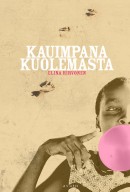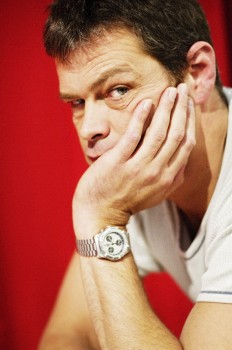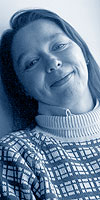Author: Maria Antas
Elina Hirvonen: Kauimpana kuolemasta [Furthest from death]
30 September 2010 | Mini reviews, Reviews
 Kauimpana kuolemasta
Kauimpana kuolemasta
[Furthest from death]
Helsinki: Avain, 2010. 240 p.
ISBN 978-952-5524-81-9
€ 30, hardback
Elina Hirvonen (born 1975) came to international attention with her first novel, Että hän muistaisi saman (English translation: When I forgot). With Kauimpana kuolemasta she shows that her success was well deserved: she has both talent and originality, and also courage linked with a sense of form. This book belongs to the genre of Finnish novels set at the interface between two countries, a device that in some hands can become a facile dramaturgical trick for the creation of contrasts. The interweaving of human stories from Finland with stories from Zambia sets all the alarm bells ringing, but the encounter between Paul and Esther, two sad people who lack a secure homeland, vibrates with emotion-charged scenes. Paul is the son of Finnish overseas aid workers, Esther is an outcast from her Zambian village, in flight from one hell to the next. Slowly Paul and Esther are brought together and the reader hovers in uncertainty as to whether their paths will ever cross. The two characters see and experience violence as they journey towards pain, but Elina Hirvonen’s sensual and life-affirming language conveys the realisation that hope is – sometimes – stronger than death.
Animal instincts
23 December 2009 | Authors, Interviews

Roman Schatz. - Photo: Veikko Somerpuro
Animals exist to make people rich. This wretched and wrong capitalist obsession is gleefully debunked in Roman Schatz’s first children’s book, with illustrator Pertti Jarla’s zany depictions of an animal revolution. Maria Antas interviews the author.
Zoo – eläimellinen tarina (‘The Zoo, a bestial story’, WSOY, 2009) is a children’s book that also appeals to the kind of adults who might love the exploits of John Cleese, Jamie Lee Curtis, and Kevin Kline in the film Fierce Creatures – this book, like the film, is about attempts to make animals seem more dangerous and attractive to an ever more jaded audience accustomed to the pace of action movies.
Christmas is coming, and a dynamic new Zoo director wants to make an unprofitable zoo into a money spinner. The zoo’s inhabitants, however, refuse to be slaves to the market economy: led by an old Sumatran tiger called Gandhi, the militant mandrill Che, dreaming of revolution, and a bat named Mother Teresa who sees the world upside-down, the animals rise up in a wild, but ultimately non-violent, insurrection. Schatz’s story evokes 20th-century utopians, and the animals’ expressions, as visualised by illustrator Pertti Jarla, awaken the reader’s conscience and our nearly forgotten ability to laugh at the way the world works. More…
Dear God
30 September 2006 | Authors, Reviews
[Maria Antas reports to God on Erik Wahlström’s novel:]
Hello God!
I have just read Erik Wahlström’s new book with you as the central character (Gud, ‘God’, Schildts, 2006), and now I think I know you and like you better than I did before. While it is true that during my career as a literary critic I have often come across novels where you appear both as an Old Testament patriarch and as the bleeding fellow human being of the Gospels, it is not until now that I have read a novel that sheds light on your complexity, while at the same time making many demands on me as a person and as a critic. More…
Hiking through a poetic universe
30 March 2006 | Authors, Reviews

Lars Huldén. Photo: Charlotta Boucht
The gods decreed that Lars Huldén was born on the same date as Finland’s national poet Johan Ludvig Runeberg (1804–1877), who wrote the words of the Finnish national anthem – and who has turned into a dead classic. Lars Huldén will never be thought of as a member of the dead poets’ society.
A collected volume entitled Utförlig beskrivning av en bärplockares väg (‘A thorough description of a berry-picker’s path’, Schildts [Finnish translation, by Pentti Saaritsa: Erään marjamatkan seikkaperäinen kuvaus, WSOY]) containing work from the whole of Huldén’s literary career – from his first book all the way to new poems written in 2005 – has been published in honour of his 80th birthday in February 2006. He has published thirty-six collections of poetry in Swedish, and it is a generous, intelligent and (self-)ironic textual universe that unfolds through the volume’s 500 pages. More…
Cosmic and comic
Issue 3/2004 | Archives online, Authors, Reviews
Sabine Forsblom’s first novel Maskrosguden (‘The dandelion god’; Söderströms, 2004) is compulsive reading, an intelligent, action-packed family chronicle, whose secretive but vulnerable female narrator has a strong sense of both the tragic and the comic in daily life and, no less important, a clear analytical understanding of historical events.
Maskrosguden is unusual among recent novels in being firmly rooted in the history of the Swedish-speaking working class in Finland. Finland is a bilingual country that contains a small but influential Swedish-speaking community mainly concentrated in Helsinki and on and around the western and southern coasts. The Swedish-speaking working class was mainly concerned with farming and fishing but, like much of the rest of the country, it was overtaken in the 20th century by rapid industrialisation. This development is one of the themes in Sabine Forsblom’s novel, which is set in the small picturesque coastal town of Borgå, fifty kilometres east of Helsinki. Today Borgå is a tourist attraction, but it was once the home of ordinary folk whose humble lives involved a constant battle for survival and integrity amid harsh working conditions. More…
Humankind in disguise
30 September 2002 | Authors, Reviews

Thomas Warburton
Thomas Warburton (born 1918) has for sixty years tossed off words, poems, narratives, translations, literary histories and articles. He transforms Finnish and English literature into Swedish (he has also has translated several of Tove Jansson’s Moomin stories into English) and writes about ancient Japanese culture.
It comes as no surprise that Thomas Warburton’s latest book is called Förklädnader (‘Disguises’). Having such a long experience he knows how to get under the skin of so many literary characters in order to draw forth their stories. More…
Life in the mist
30 December 2001 | Authors

Photo: C-G Hagström
Although most famous for her classic Moomin tales for children, Tove Jansson (1914–2001) also wrote extensively for adults. Maria Antas is surprised by the unexpected coldness of many of these stories of art and solitude
It was easy to love Tove Jansson. The creator of the Moomin characters, painter, author of children’s books and books for adults, she was the public symbol of a rare combination of pure wisdom and human kindness. Finns needed her. As she records in the fragmentary letters that make up the short story ‘Meddelande’ (‘Messages’), people turned to her in order to ask for advice on the most diverse matters: how does one become a good artist, help me to understand my parents, my cat has died: help me! More…
Pleasures of war
Issue 3/2001 | Archives online, Authors, Reviews
Ulla-Lena Lundberg’s novel Marsipansoldaten (‘The marzipan soldier’, Söderström & Co., 2001) charts the lives of a family of Swedish-speaking Finns thrown into the vortex of Finland’s Second World War struggle against the Soviet Union. Maria Antas talks to the author about the strange normality of war – and her characters’ obsession with food
It comes as something of a surprise when Ulla-Lena Lundberg suddenly says, despite its subject, that her war novel is probably the most light-hearted book she has written.
Lundberg (born 1947) made her literary debut as a teenager as early as 1962, and has since written successfully in many genres: travel and cultural writing about Japan, the USA, the Kalahari Desert and Siberia. A wide-ranging trilogy about seafaring on the Åland islands from the mid-19th century to the 1990s has been her biggest success, and began with the novel Leo. The starting-point for Marsipansoldaten is a collection of letters Lundberg has owned since she was sixteen. The letters of her own father and her uncles from the front to their families at home have lived with her and have, as it were, been waiting to be rewritten as a story. More…
From A to Z
31 March 2001 | Authors, Reviews
 Susanne Ringell’s new work is the shortest of the books published in 2000. It easily disappears on the bookshelf if one doesn’t carefully remember where one put it. Only 62 pages. Yet it constructs a whole civilisation and a humanity.
Susanne Ringell’s new work is the shortest of the books published in 2000. It easily disappears on the bookshelf if one doesn’t carefully remember where one put it. Only 62 pages. Yet it constructs a whole civilisation and a humanity.
Av blygsel blev Adele fet (‘It was embarrasment that made Adele fat’) is an ABC for grown-ups. At each letter we meet a person. At ‘A’ we encounter Adele, who grows as fat as she is shy. She carries 78 kilos of shyness inside her, and she eats until her body is the same weight. At ‘W’ we meet Walter, who runs away from the zone therapist’s clinic to the restaurant. He is in no doubt as to what does body and soul good: a rare beef steak, in spite of his wife’s pleas in favour of the beneficial therapy. And at ‘E’ and ‘F’ we meet Egil and Folke: two shy men waiting for a train – and for a long period of waiting to end.
Susanne Ringell gives her readers an entire alphabet; she restores to us the foundation for our structuring of language and the world around us. But a language without people would be dead. So each letter is a person; each letter is coloured by a human fate that seldom figures largely in the history books, but on which Susanne Ringell confers dignity. The people we encounter in the book are lonely. That is certainly nothing new in literature – but Ringell has an unusual gift of being able to create dignity around the most bizarre creatures. More…
About butterflies
30 September 2000 | Authors, Reviews

Photo: Charlotta Boucht
To think that it can be so cold in Cairo…
A woman sits there writing, and she feels cold. Her name is merely J; around her lie her mother’s posthumous papers. They look like a kaleidoscope. Beautiful formations succeed one another, but the picture is never fixed or unambiguous. Not until the day J is able to see something more than the enticing pictures in the kaleidoscope is she free. That day she stops feeling cold. That day she leaves Cairo in order to continue loving in Finland. More…
-
About the author
Maria Antas (born 1964) is a Project Manager at FILI (Finnish Literature Exchange), a literary scholar (she has studied the childhood memories of Finland-Swedish authors Tove Jansson, Solveig von Schoultz and Renata Wrede) and former editor-in-chief of the women’s magazine Astra Nova.
© Writers and translators. Anyone wishing to make use of material published on this website should apply to the Editors.
